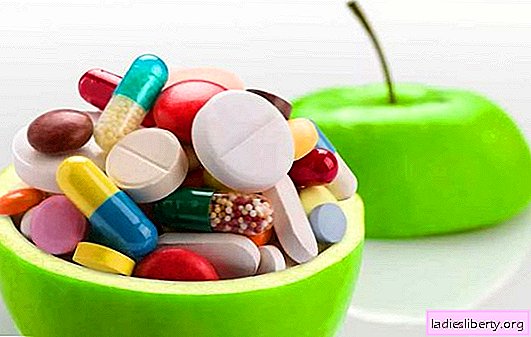
During lactation, an increased consumption of vitamins occurs in a nursing woman, since a significant part of them goes to the baby with milk. It is believed that with a full and sufficient nutrition of a woman before and after childbirth, a lack of vitamins in her body does not arise and additional medications are not needed. The need for them arises with acute deficiency resulting from poor nutrition. In such cases, vitamin deficiency with all severe manifestations may develop. To avoid such consequences, it is advisable to take vitamins during breastfeeding.
The reasons leading to the additional intake of vitamins
Vitamins during breastfeeding “go away” with breast milk, since their reserves in the baby’s body are quickly depleted immediately after birth and require quick replenishment.
It is impossible to restore the required amount of vitamins in the body of a nursing woman solely due to their content in food: food does not cover the amount needed for a nursing mother, given that not all fruits and vegetables, as well as other products containing the necessary vitamin complexes, can be consumed. The reason for this may be:
• possible allergies;
• flatulence;
• constipation or diarrhea in a child.
There are a number of reasons that require the use of vitamins by a woman during breastfeeding. These include:
• poor ecology, because of which vegetables and fruits do not contain the amount of vitamins that a child and mother need;
• the existing pathology of the digestive tract in a nursing mother, due to which the absorption of vitamins from food is slowed down - their lack in the body is further exacerbated;
• constant lack of sleep, anxiety, fatigue, possible problems with lactation, which lead to the appearance of hypovitaminosis associated with an increased consumption of vitamins in such conditions;
• monotonous food that does not contain enough proteins, vitamins, trace elements, respectively, they are few in the milk of a nursing mother, which in addition to hypovitaminosis in her leads to a lack of vitamins in the child.
Vitamin deficiency in women with lactation
According to the results of numerous studies, in 75% of women during lactation, polyhypovitaminosis is determined - a lack of 3 or more necessary vitamins.
In total, 13 vitamins have been identified that must be present in the body in the required amount. Of these, only 4 are fat soluble (A, D, E, K). These nutrients can accumulate in the body. The rest - these are B vitamins and ascorbic acid - are water soluble. To avoid hypovitaminosis, their supply should be constantly replenished.
From fat soluble:
• retinol (vitamin A) is synthesized in the body from carotene, supplied with food;
• cholecalciferol (vitamin D3) is formed in the skin under the influence of ultraviolet radiation;
• Vitamin K2 is produced as a result of the activity of bacteria in the intestinal lumen. Its hypovitaminosis develops with intestinal pathology.
All fat-soluble vitamins accumulate in the fat layer and liver, with a deficiency arising, their reserves begin to be used.
Most often, hypovitaminosis C and B vitamins develop. These vitamins during breastfeeding require constant replenishment, since they are water-soluble and excreted in the urine. Therefore, a woman during lactation must carefully monitor her condition and nutrition. At the slightest sign of a lack of vitamins, measures must be taken to restore them. If the appearance and quality of the teeth have worsened, hair loss, dullness, brittleness, and stratification of nails have appeared - these are signs of hypovitaminosis. Its negative consequences affect not only the nursing mother, but also the baby: its growth and development are slowed down.
Lack of fat-soluble vitamins for lactation
The essential fat-soluble vitamins for breastfeeding that a woman and a newborn need:
1. Vitamin D (calciferol) promotes good absorption of calcium and phosphorus - the main components of bones and cartilage, thereby:
• participates in the formation of the skeleton, ligaments and cartilage;
• mineralizes bones and rudiments of teeth;
• optimizes the functioning of the heart muscle;
• is an important component for the prevention of rickets.
A nursing mother improves the quality of skin, hair, nails, teeth. Part of the vitamin (D2 - ergocalciferol) enters the body with food, and another part (the main) is produced in the epidermis under the influence of sunlight. (D3 - cholecalciferol). In addition to deterioration in the quality of hair, skin, nails and teeth, osteoporosis develops, severe pain in the bones and muscles can occur - these are manifestations of D. hypovitaminosis.
2. Vitamin E (tocopherol) prevents the development of postpartum depression and muscle weakness. Affects bone growth and the formation of connective tissue of articular cartilage. In combination with ascorbic acid, it firmly binds free radicals that have a destructive effect on body tissues.
3. Vitamin A (retinol) is also a powerful antioxidant, participates in the metabolism of calcium and phosphorus, therefore it plays an important role in bone growth and the formation of connective tissue, the formation of visual reflexes.
Lack of water soluble vitamins
Vitamin C:
• increases the immunity of the mother and child, protecting against the harmful effects of infectious agents;
• improves the absorption of minerals, primarily calcium;
• accelerates collagen synthesis;
• indirectly potentiates the formation of steroid hormones.
Vitamin B1 (thiamine) - the "vitamin of optimism": if it is deficient, nervous disorders, a decreased mood background, irritability, and fatigue are possible.
Vitamin B2 (riboflavin) is a growth factor: it potentiates the development of the skeleton, muscles, and brain of a child. Supports the mother’s nervous system.
Vitamin B3 (PP, nicotinic acid) is involved in the metabolism of fats, carbohydrates and proteins, regulates blood circulation, and normalizes the functioning of the digestive tract.
Vitamin B6 (pyridoxine) takes part in the formation of the nervous system of the newborn - in the development of the spinal cord and brain, "controls" hematopoiesis, the synthesis of pituitary hormones (growth hormones).
Vitamin B12 (pyridoxine) supports the normal functioning of the nervous, digestive, hematopoietic systems in the mother and child.
Modern Vitamins for Breastfeeding
All of the vitamins listed are mandatory for a woman and a child, therefore, due to a restriction in the diet of a nursing mother, which is associated with possible or existing allergic reactions to food components in a newborn, a decrease in the amount of vitamins in vegetables and fruits after winter, an additional intake of vitamins with breastfeeding.
Currently, there are many multivitamin complexes for lactating women. For the best choice, you need to consult a specialist who will appoint the most effective of them in each case, taking into account the anamnesis, complaints, symptoms, objective status, region of nutrition and diet.
Elevit Pronatal contains all the necessary fat-soluble (A, D3, E) and water-soluble (C, group B) vitamins, as well as a number of micro and macro elements. Due to the high magnesium content it is recommended for strengthening the nervous and cardiovascular systems. It contains no iodine. If there are indications for its use (pathology of the thyroid gland), you need to take this trace element additionally. 1 tablet is prescribed once.
Vitrum Prenatal Forte consists of 12 vitamins, 9 minerals (including iodine). Reception is indicated from the first days of lactation, especially with anemia and persistent hypovitaminosis. The daily dose is 1 capsule.
Pregnit: in its composition, in addition to vitamins, contains only 2 minerals (iron, calcium). There are no iodine, copper, zinc, magnesium, phosphorus - these trace elements must be taken additionally.
The alphabet “Mom’s Health” contains the entire spectrum of vitamins (13), micro and macro elements (11), and the amino acid taurine, which is part of the organ of vision, brain, liver, and muscles.
Complivit "Mom" is almost all the vitamins and minerals necessary for a nursing woman and a child, except iodine. But due to the low content of vitamins A and D, it is not recommended to take this complex during the first 3 months of feeding.
It is important to remember that vitamins are drugs, their overdose can be clinically more severe than a lack of the same vitamins. Therefore, it is necessary to carefully follow the instructions so that hypervitaminosis does not develop.











